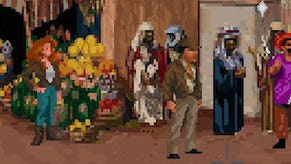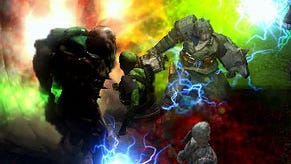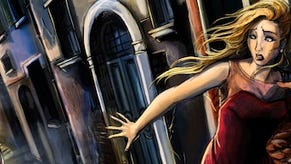Moebius: Empire Rising PC Review: Let's Go Round Again
Renowned game writer and Sierra On-Line alumnus Jane Jensen is back with a brand new adventure that will have you scratching your head until the small hours.
This article first appeared on USgamer, a partner publication of VG247. Some content, such as this article, has been migrated to VG247 for posterity after USgamer's closure - but it has not been edited or further vetted by the VG247 team.
Jane Jensen's writing has many strengths, but one of the things she's best at is creating "likeable jerk" protagonists.
Gabriel Knight is perhaps her most well-known and most enduring creation in this style. So beloved is Knight as a character to gamers of a certain age that Jensen is working on a beautiful-looking remake of his first adventure Sins of the Fathers to mark its 20th anniversary, in fact. But with the launch of Moebius, he's got company: protagonist Malachi Rector is one of the most brilliantly flawed protagonists I've had the pleasure of controlling in quite some time.

Rector isn't just a clone of Knight, though. Sure, he's a bit of a jerk to the people around him, much as Knight was, but it's a different kind of jerkiness. While Knight was a womanizing, manipulative and overly curious individual who had a habit of getting himself into sticky situations -- character traits that culminated in him realizing his destiny as the legendary Schattenjäger (Shadow Hunter) of the ancient German Ritter clan -- Rector initially simply seems somewhat misanthropic. There are shades of TV's Dr. House in his depiction -- a brilliant mind perpetually protected by a spiky, abrasive personality -- but over time, as we, the audience, get to know him a little better, we see that there is a softer side to him, not to mention plenty of unresolved questions that Jensen has smartly left up to the player's own interpretation or open for exploration in future installments.
Like Knight the bookseller and struggling author, Rector has a fairly mundane occupation, though unlike Knight (at least in his initial adventure) he's very successful at it. A renowned history expert and antiques assessor, Rector travels the world to assess the authenticity of seemingly priceless artifacts and determine whether or not they are what their owners or sellers say they are -- a service for which he is paid so handsomely that money is, for him, no object whatsoever. Early in the game, his brilliant observational eye, deductive mind and photographic memory are recruited by the mysterious government organization FITA, and he's assigned to investigate a number of people and assess how closely the patterns of their lives recreate those of people from history. From here, things inevitably get complicated with the arrival of American ex-soldier David Walker, whom Rector finds strangely familiar, and plenty of questions surrounding FITA's true motivations.

The story as a whole is a fascinating roller-coaster ride that, although being self-contained in a single game, nonetheless unfolds in an episodic manner similar to Cognition, a game Jensen worked on recently as story consultant. Each episode is clearly structured around one central mystery, the main objective being to uncover sufficient "data points" to analyze said mystery -- be it person or artifact -- and come to a conclusion. It's always made abundantly clear when you've found enough information to proceed -- or not, for that matter -- and, if you do find yourself getting stuck, a robust (and optional) hints system provides a nudge in the right direction without outright telling you what to do next.
As with the adventure games of yore, though, there's plenty of optional stuff to discover, largely making use of Rector's keen perception and deductive mind. Most of the characters with whom you'll interact over the course of the story present the opportunity for you to analyze them upon a first meeting, and in these sequences you'll be prompted to look at several key characteristics, draw some conclusions from them and, as a result, be able to figure out what sort of person you're dealing with before you've even spoken to them in many cases. The analysis sequences are occasionally frustrating if you can't find quite the right combination of characteristics to put together -- the game bluntly just tells you that you're wrong if you submit an incorrect analysis rather than giving you any hints -- but over the course of my playthrough I only ran into this issue a couple of times, since the analyses were, for the most part, very logical in nature.
Ditto for the puzzles throughout the game, too. With the exception of a few cheap instant death sequences later in the story -- which, to their credit, allow you to simply retry rather than forcing you to reload your last save as in the "good" old days -- the puzzles are eminently logical and sensible in nature, minimizing the traditional adventure game practice of opening up your inventory and clicking every item you're carrying on every hotspot on every screen until something meaningful happens. Even the instant death sequences are fairly logical and fit the narrative at those moments, as it happens; it's just a bit jarring to run afoul of them when the rest of the game doesn't punish incorrect choices or experimentation.

Moebius is a well-presented game. Its limited budget compared to extravagant triple-A productions occasionally shows through with a few wooden animations, the occasional slightly cheesy use of floating text drifting by to reflect thoughts running through Rector's head and a couple of unintentionally terrifying facial expressions from a couple of characters, but these minor flaws are more than made up for with some beautifully depicted, colorful backgrounds and the strong sense of style that the game has. Characters, although fairly simply modelled, all look distinct from one another, both in terms of their facial appearance and their overall silhouettes, and the voice actors are perfectly cast for the roles. Of particular note in this regard is veteran voice actor Owen Thomas' wonderful portrayal of Rector; his deliciously full-bodied tones, immaculate enunciation and convincing accent really help to bring an already well-defined character to life.
And voice isn't the only strong point in the sound department; Robert Holmes' excellent soundtrack fits the on-screen action and various locales extremely well, but also has a somewhat nostalgic bent, bringing adventure games of the past to mind. Rather than the subtle, cinematic-inspired "background music" approach of many modern soundtracks, Holmes' score very much has its own character, with the various locations Rector visits all having their own eminently hummable themes. In places, in fact, it's strongly reminiscent of the Gabriel Knight: Sins of the Fathers score -- no bad thing, since Sins of the Fathers had excellent music, and also unsurprising, since that game's soundtrack was also the work of Holmes.

All this adds up to a game that feels like it's out of its own time. Adventure games have been far less "dead" than the mainstream press likes to make out for a long time, of course, thanks in part to the work of studios such as Daedalic and indeed Jensen's collaborators on Moebius, Phoenix Online Studios, but Moebius in particular feels like a lost adventure from the genre's mid-'90s golden age -- albeit one brought up to date with more modern technology and production values.
And surprisingly, this doesn't leave the game feeling dated; rather, it simply evokes a pleasant feeling of nostalgia for the earlier days of gaming. Not only that, it's strong evidence that Jensen has most certainly still "got it" when it comes to writing compelling characters, crafting interesting, intricate stories and designing fiendish but fair challenges for her characters -- and players -- to overcome.
The game's ending makes it abundantly clear that there's a lot more Jensen wants to explore with regard to Rector as a character, his relationships with others -- particularly Walker -- and the world she's created, but she wisely restrains herself both from trying to do too much in this initial offering and leaving things on an unresolved cliffhanger. Moebius ends in a satisfying manner, but with the promise of much more to come in the future; personally, after enjoying this installment immensely, I'm very much looking forward to seeing what's next, and sincerely hope that between this title and the impending Gabriel Knight remake that we can well and truly see Jensen getting back to doing what she does best on a more regular basis.
The Nitty Gritty
- Visuals: The background art is beautiful and colorful, and clever use of a quasi-3D effect on the camera gives it a feeling of real depth. Character models have a strong sense of style, but suffer a little from wooden animations at times.
- Music and Sound: Robert Holmes' fantastic score calls his previous work on Gabriel Knight to mind, while some stellar voice acting -- particularly Owen Thomas' depiction of the protagonist Malachi Rector -- brings the diverse characters in this story to life.
- Interface: A simple, unobtrusive interface makes interacting with the game world and its characters simple and straightforward, while an optional hint system allows those less familiar with adventure game conventions to get a bit of help when they need it.
- Lasting Appeal: You'll power through the story in about 10 hours or so, but this feels like a good length, particularly as the ending strongly implies this isn't the last we've seen of Malachi Rector. Once you're done, there's little incentive to replay save to experience the story again -- though for some, this will be motivation enough, much like a good book.
ConclusionA welcome return for Jane Jensen, and the beginning of a potentially fascinating series with an intriguing protagonist. More, please.





